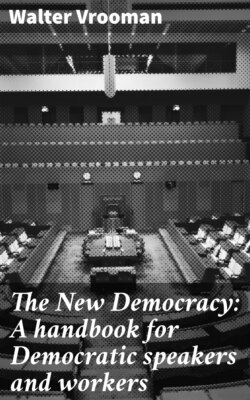Читать книгу The New Democracy: A handbook for Democratic speakers and workers - Walter Vrooman - Страница 10
На сайте Литреса книга снята с продажи.
PRE-ARRANGED APPLAUSE ONE-HALF OF ORATORY.
ОглавлениеTable of Contents
If friends can secure the free service of a drum corps, a brass band, or a quartette of singers, to help draw the people together, the speaker's work will, of course, be greatly lessened, and much will be done toward saving the voice and energies otherwise necessarily expended in attracting an audience. He will thus be enabled to concentrate all his powers, convincing and teaching his hearers.
But in the absence of drums or music, there is nothing so helpful to the speaker in getting a crowd and in holding it after it has congregated, than a little skilfully pre-arranged applause. If several men, helped by a dozen boys, take their places around the speaker, and from the start take off their hats and cheer lustily about every three sentences, not only does the noise attract attention and draw listeners, but it impresses deeply those who are present, so that each word of the speaker has its effectiveness multiplied. A few men, starting off in this way (if the speaker is bright and forcible), will be joined by half the audience, and, in outdoor speaking, generous applause doubles the effect of oratory. It not only adds weight to the speech, but it strengthens and cheers the speaker, stimulating him to his highest efficiency. It infuses new blood into his veins and new breath into his lungs. It quickens his heart beats and helps clear his voice. It at once establishes a rapport between the talker and the talked-to, and converts what might otherwise be a number of isolated units into a sort of organism, the vital principle of which is one central enthusiasm voiced by the speaker.
To convince the friends of the movement of the necessity for loud cheering from the start by pre-arranged, conscious effort, is often quite difficult, although it is important. Much tact and skill are required to select a dozen young men before the meeting, and train them in a few minutes so that they will follow the cue of the man who is to lead the applause and cheer when he gives the word.
A very important point, where young boys are concerned, is to stop their cheering when the leader stops. Unless you have a confederate of tact and personality there is danger that the boys, once started yelling, will enjoy it so hugely that they will keep it up in a disorderly way, and injure the meeting much more than they help it. But properly drilled, a dozen young boys are worth almost as much as a drum corps. Under proper leadership, they will stop instantly at the pre-arranged signal, and enjoy the military precision. Ten minutes training by an experienced man will suffice to complete their education in this regard.
